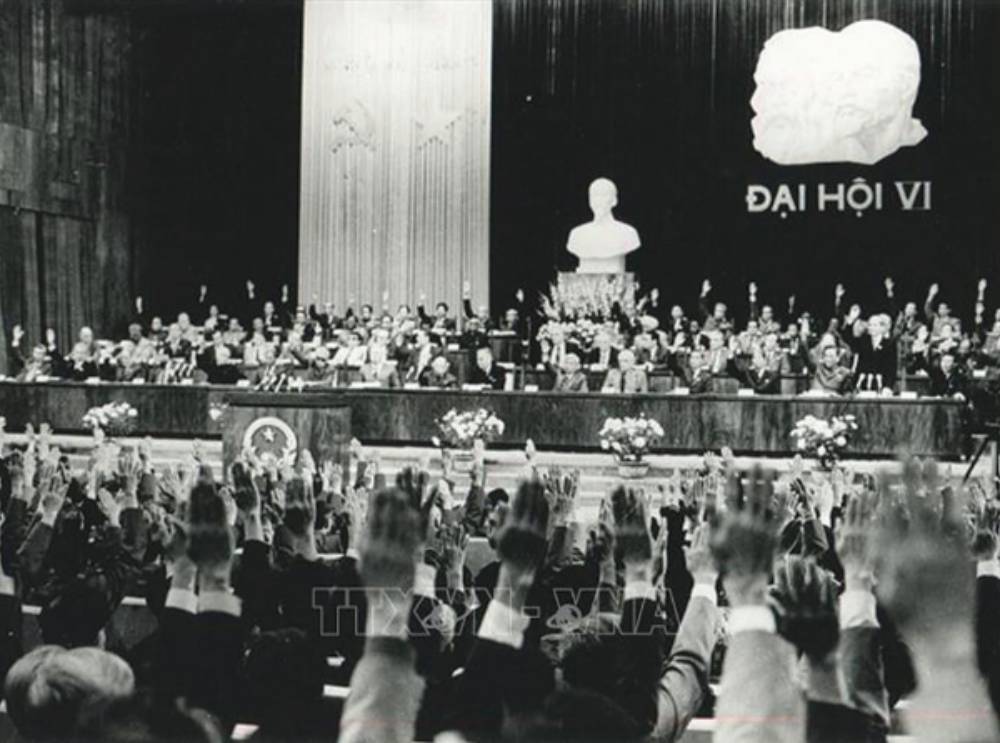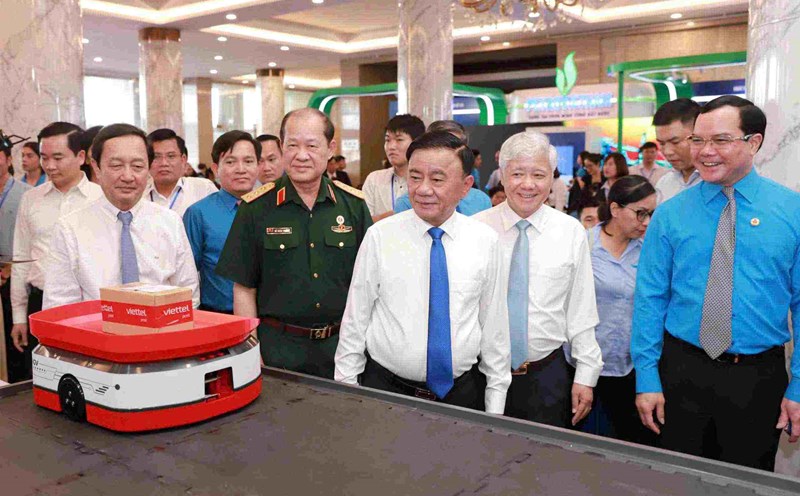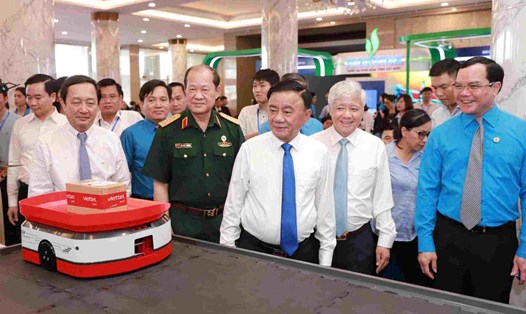In the journey to rebuild the country and strengthen that trust, the Vietnam Fatherland Front has made a strong transformation, affirming its position as the largest voluntary political alliance and association organization, where "Party spirit and People's heart" converge, and its strength is measured by the people's trust.
"Flowing Flowing Flowing Flowing" for Innovation
In the late 70s and early 80s of the 20th century, our country faced difficulties. The centralized, unmet and defensive planning mechanism exposed serious shortcomings, poor production, skyrocketing inflation, and extremely difficult people's lives. It is not only a material crisis, but also a profound "crisis of faith". The people's trust in the leadership of the Party and the future of the country has been seriously eroded.
In that context, the Doi Moi campaign in 1986 was an inevitable "ordern" of history, a vital choice of the nation. The Doi Moi guidelines, with the spirit of "looking straight at the truth, assessing the truth, clarifying the truth", have set an urgent requirement to Doi Moi the Party's leadership method and the role of the Front. The thinking of "People know, people discuss, people do, people check" becomes a guideline.
The Vietnam Fatherland Front (VFF), with its historical role as gathering and unity of all classes of people, is facing a new task. Instead of just an organization "moving" the masses to implement the policy from top to bottom as in the subsidy period, the Front must become a real two-way bridge. On the one hand, conveying the Party's guidelines to the people; on the other hand, and more importantly, representing the legitimate and legal rights and interests of the people, honestly reflecting their thoughts and aspirations to the Party and the State.
The mission of the Front in the Doi Moi period is to recreate and strengthen the trust. Trust cannot be built by orders, but must be by practical actions, by solving life's pressing problems, and by ensuring that people are truly masters.
Building institutions for social supervision and criticism
One of the remarkable steps forward of the Vietnamese political system in the Doi Moi period is the institutionalization of the role of supervision and social criticism of the Vietnam Fatherland Front and socio-political organizations. This is a key mechanism to transform trust from an abstract concept to a specific political power of the people. Before Doi Moi, the concept of "social criticism" almost did not exist. book decisions are often issued in one go. But the reality of the crisis has shown that a decision that is far from reality and does not listen to the people's opinions will lead to failure. The Doi Moi process requires an effective mechanism to "fence" and "control" power, and the Front is assigned that responsibility.
The Front must continue to innovate, must be truly real, avoid formal diseases and just socialization. The Front must be a place for people to see themselves listened to, respected and protected.
This role is stipulated in the Constitution and concretized by legal documents, especially the Law on the Vietnam Fatherland Front. The Front has participated extensively in the process of law-making, from giving comments on draft constitutions, important laws (such as the Land Law, the Enterprise Law, etc.) to macro policies. Millions of opinions of people from all over the country, from all walks of life, have been compiled, filtered by the Front and translated to legislative and executive agencies.
The Front's supervision activities are becoming more and more substantial. That is to supervise policy implementation at the grassroots level, supervise the activities of public authorities, and especially supervise the ethics and lifestyle of cadres and party members. Through People's Inspection Committees and Community Investment Supervision Committees in communes and wards, people directly "show off" to works and projects, and to perform public duties. When a road is made reckless, a project is "suspended" causing waste, or a cadre shows signs of bureaucracy and extortion, the voice of the Front at the grassroots level is the first voice to protect the interests of the community.
The function of social criticism is a "specialty" of the Doi Moi process. The Front organizes conferences and seminars, collecting opinions from experts, scientists, scholars, intellectuals, religious dignitaries, etc. to criticize draft laws and major socio-economic projects. The frank, multi-dimensional, and constructive criticism of the Front has helped the Party and State adjust many important decisions, avoiding costly mistakes, making the policy of "unity of the people" more "popular".
It can be said that the function of supervision and criticism is the most important institutional "filter" that the Front assumes, a mechanism for "reporting to the Party" to meet the "people's heart" before becoming a national policy maker. This has strengthened the people's belief in a truly "people-powered, by the people and for the people" rule-of-law state.
On December 12, 2013, the Politburo (11th tenure) issued Decision 217-QD/TW on "Regulations on supervision and social criticism of the Vietnam Fatherland Front and socio-political organizations" and Decision 218-QD/TW on "Regulations on the Vietnam Fatherland Front, socio-political organizations and people to contribute to giving opinions on Party building and government building".
This is considered a historic step forward, creating the most solid and clear legal corridor ever for the Front's activities. For the first time, "monitoring" and "discussing" are not only a task of mobilization, but have become a mandatory mechanism and process in the operation of the political system. Party committees and authorities at all levels must listen to, absorb and respond to the opinions of the Front. This has enhanced the position and "power" of the Front's voice, turning the Front into an indispensable pillar in the power control mechanism, building a clean and strong Party and government.
Bringing faith into life
If supervision and criticism are the construction of an " institutionality" of trust, then the campaigns and patriotic emulation movements chaired by the Front are the way to "nurture" faith in daily life. During the Doi Moi period, movements have had fundamental changes in quality: from focusing on macro goals, to directly focusing on the practical benefits of people in the community.

The campaign "All people unite to build a cultural life in residential areas" (launched in 1995), later elevated to the Campaign "All people unite to build new rural areas, civilized urban areas", is a typical example. The goal of the campaign is not general slogans, but specific results: a clean concrete road, a " security light" at night, a village cultural house, to eliminate bad customs, to help each other escape poverty, to maintain security and order.
The Front has cleverly turned the Party's major goals (building new rural areas, civilized urban areas) into "real people, real deeds" in each residential group, each hamlet. its strength lies in the fact that it arouses the spirit of self-management, consensus and on-site resources of the community itself. Trust is built when people see that their lives improve every day, and they are the ones who contribute to that change.
In particular, the spirit of "mutual love and support" and "the healthy leaves cover the torn leaves" - a core value of the nation - has been strongly promoted by the Front through social activities. The "For the Poor Day" campaign ( launched in 2000) and the establishment of the "For the Poor" Fund have become one of the biggest bright spots in the Front's work. Tens of thousands of billions of VND have been mobilized, millions of "Grand Unity" houses have been built.
The power of people's trust is most clearly demonstrated every time the country faces natural disasters and enemy disasters.
During historic floods in the Central region, or especially during the COVID-19 pandemic, the Vietnam Fatherland Front has been the center for receiving and coordinating all relief resources. Millions of people, businesses, overseas Vietnamese... have trusted and conveyed their hearts through the "channel" of the Front. The Front's call for "All people unite, strive to prevent and combat the COVID-19 epidemic" has created a wave of united solidarity, mobilizing huge resources for the Vaccine Fund and social security activities. In the most difficult moments, the Front has proven itself to be the most reliable address for people to express their trust and share responsibility, turning personal trust into the material strength of the whole community.
The foundation of democracy and social consensus
The strength of the Front in the Doi Moi period lies not only in movements, but also in its key role in building a socialist democracy and creating social consensus. The Front is a pillar in implementing representative democracy. The work of consulting, selecting and introducing candidates for National Assembly and People's Councils at all levels is the core task of the Front. Through 5 steps of consultation, the Front ensures the democratic election process, in accordance with the law, selecting outstanding delegates who are worthy of representing the will and aspirations of the people. At the same time, the Front organizes meetings with voters, creating a direct dialogue channel for people to "reserve" and "monitor" their own representatives.
The strength of people's trust, fostered and promoted through the Front organization, is the most endogenous strength, the most solid "committees" to protect the Party, protect the regime and ensure the sustainable success of the Doi Moi process.
The Front is the center of the great national unity bloc. In the market mechanism, society has increasingly clearly distinguished classes and social stratification. New classes have appeared such as businessmen, young intellectuals, freelance workers, etc. Along with that, the needs for beliefs and religions of the people are increasingly diverse. The role of the Front at this time is the "common model", the "common home" for all classes, classes, ethnic groups, religions, and even overseas Vietnamese.
The Front has played a good role in bridging, listening and gathering opinions from intellectuals, scientists, religious dignitaries, outstanding people among ethnic minorities, and the business community. By respecting differences and finding similarities, the Front has contributed to resolving social conflicts, creating consensus for the common goal of "rich people, strong country, democracy, fairness, and civilization". The Doi Moi cause cannot be successful without consensus. And it is the Front that is the "conductor" who coordinates interests, harmonizes views, so that millions of hearts of Vietnamese people, wherever they are, do whatever they want, are all in unison for the prosperity of the Fatherland.
Looking back on the nearly 40-year journey of Doi Moi, it can be affirmed that the Vietnam Fatherland Front has successfully fulfilled its historical mission. From an organization mainly responsible for political mobilization, the Front has risen to become an indispensable institution in the political system, a pillar of socialist democracy, and the center of the great national unity bloc.











